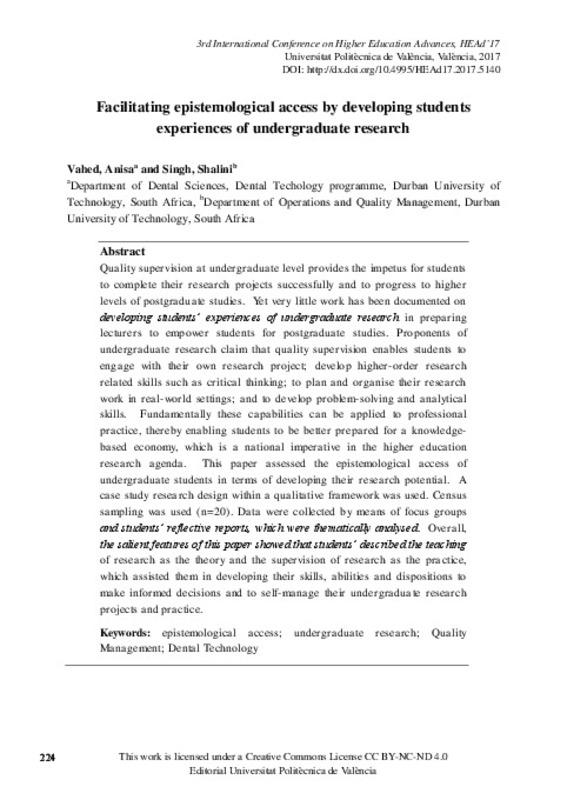JavaScript is disabled for your browser. Some features of this site may not work without it.
Buscar en RiuNet
Listar
Mi cuenta
Estadísticas
Ayuda RiuNet
Admin. UPV
Facilitating epistemological access by developing students experiences of undergraduate research
Mostrar el registro sencillo del ítem
Ficheros en el ítem
| dc.contributor.author | Vahed, Anisa
|
es_ES |
| dc.contributor.author | Singh, Shalini
|
es_ES |
| dc.date.accessioned | 2018-06-12T12:35:18Z | |
| dc.date.available | 2018-06-12T12:35:18Z | |
| dc.date.issued | 2017-06-26 | |
| dc.identifier.isbn | 9788490485903 | |
| dc.identifier.uri | http://hdl.handle.net/10251/103925 | |
| dc.description.abstract | [EN] Quality supervision at undergraduate level provides the impetus for students tocomplete their reseach projects successfully and to progress to higher levels of postgraduate studies. Yet very little work has been documented on developing students' experiences of undergraduate reserach. Proponents of undergraduate research claim that quality supervision enables students to engage with their own project; develop higher-order research related skills such as critical thinking; to plan and organise their research work in real-world settings; and to develop problem solving and anlytical skills. Fundamentally these capabilities can be applied to professional practice, thereby enabling students to be better prepared for a knowledge-based economy, which is a national imperative in the higher education research agenda. This paper assessed epistemological access of undergraduate students in terms of developing their research potential. A case study research design within a qualitative framework was used. Data were collected by means of focus groups and students' reflective reports, which were thematically analysed. Overall, the salient features of this paper showed that students' described the teaching of research as the theory and the supervision of research as the practice, which assisted them in developing their skills, abilities and dispositions to make informed decisions to self-manage their undergraduate research projects and practice. | es_ES |
| dc.format.extent | 7 | es_ES |
| dc.language | Inglés | es_ES |
| dc.publisher | Editorial Universitat Politècnica de València | es_ES |
| dc.relation.ispartof | Proceedings of the 3rd International Conference on Higher Education Advances | es_ES |
| dc.rights | Reconocimiento - No comercial - Sin obra derivada (by-nc-nd) | es_ES |
| dc.subject | Higher Education | es_ES |
| dc.subject | Learning | es_ES |
| dc.subject | Educational systems | es_ES |
| dc.subject | Teaching | es_ES |
| dc.subject | Epistemological access | es_ES |
| dc.subject | Undergraduate research | es_ES |
| dc.subject | Quality Management | es_ES |
| dc.subject | Dental technology | es_ES |
| dc.title | Facilitating epistemological access by developing students experiences of undergraduate research | es_ES |
| dc.type | Capítulo de libro | es_ES |
| dc.type | Comunicación en congreso | es_ES |
| dc.identifier.doi | 10.4995/HEAD17.2017.5140 | |
| dc.rights.accessRights | Abierto | es_ES |
| dc.description.bibliographicCitation | Vahed, A.; Singh, S. (2017). Facilitating epistemological access by developing students experiences of undergraduate research. En Proceedings of the 3rd International Conference on Higher Education Advances. Editorial Universitat Politècnica de València. 224-230. https://doi.org/10.4995/HEAD17.2017.5140 | es_ES |
| dc.description.accrualMethod | OCS | es_ES |
| dc.relation.conferencename | Third International Conference on Higher Education Advances | es_ES |
| dc.relation.conferencedate | June 21-23,2017 | es_ES |
| dc.relation.conferenceplace | Valencia, Spain | es_ES |
| dc.relation.publisherversion | http://ocs.editorial.upv.es/index.php/HEAD/HEAD17/paper/view/5140 | es_ES |
| dc.description.upvformatpinicio | 224 | es_ES |
| dc.description.upvformatpfin | 230 | es_ES |
| dc.type.version | info:eu-repo/semantics/publishedVersion | es_ES |
| dc.relation.pasarela | OCS\5140 | es_ES |








